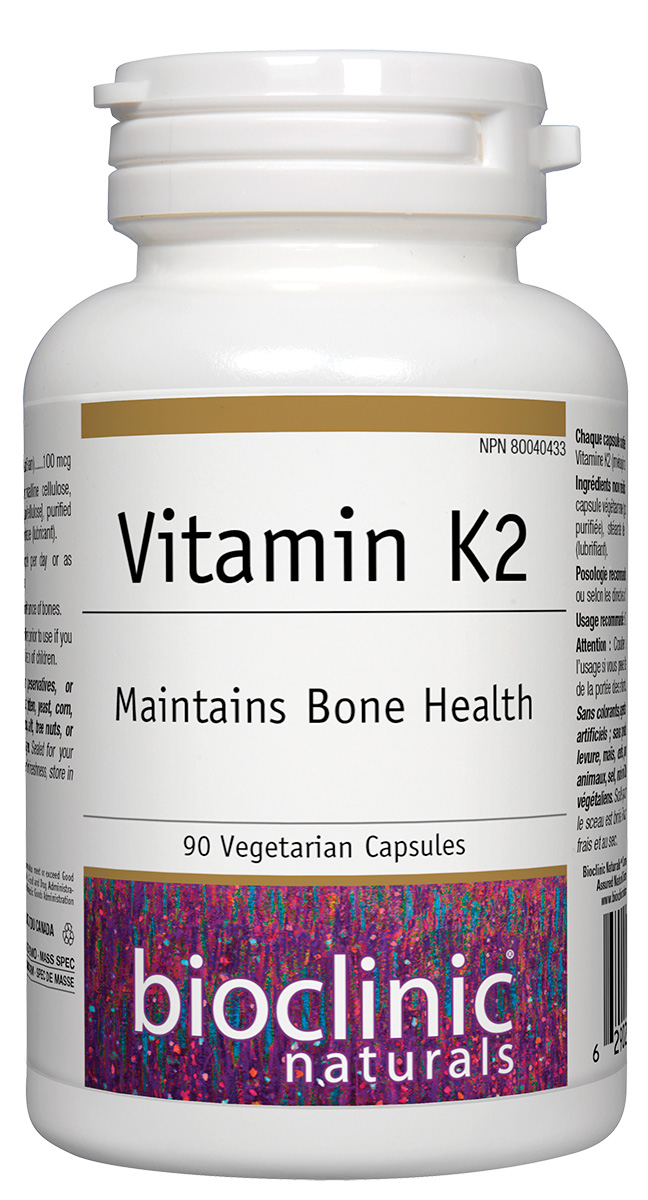
Maintains Bone Health
100 mcg
90 Vegetarian Capsules ( SKU: 9316, NPN: 80040433 )
Benefits
- Provides 100 mcg per serving of vitamin K2 as menaquinone-7 (MK-7)
- MK-7 has the greatest half-life of all forms of vitamin K, as well as the best extra-hepatic distribution
- Vitamin K2, particularly MK-7, allows for much lower dosing with significant clinical benefit
- Extracted from natto beans, the food-based highest naturally occurring MK-7
- Suitable for vegetarians/vegans
Feature Summary
Discovery of vitamin K-dependent (VKD) post-translational modification of proteins involved not only in coagulation, but also in bone metabolism, vascular calcification, cell growth regulation, and even ATP production has dramatically shifted both the physiological and clinical importance of this enzymatic cofactor.1,2,3 VKD proteins have a nearly ubiquitous presence in diverse cell types, and modification by γ-carboxylation is necessary for biological activity. Dietary intake of vitamin K is often insufficient, and vitamin K is diverted to those enzymes critical to short term survival (e.g. coagulation), leading to suboptimal carboxylation of VKD proteins associated with aging and chronic disease, such as matrix Gla protein, osteocalcin and Gas6.4
Clinically, a lower intake of vitamin K has translated into a greater risk for myocardial infarction and stroke, plaque instability, and most recently, diabetes.5,6 A greater intake of vitamin K, particularly K2, has been associated with lower all-cause mortality, coronary heart disease, aortic calcification, as well as cancer incidence and fatality.7,8 Higher intake of MK-7, which has the longest half-life and the most extra-hepatic distribution, has been associated with lower risk of fracture and greater BMD.9-13
Medicinal Ingredients
| Each Capsule Contains: | |
| Vitamin K2 (Menaquinone) (MK-7) (Natto Bean) | 100 mcg |
Non-Medicinal Ingredients
Microcrystalline cellulose, vegetarian capsule (carbohydrate gum [cellulose], purified water), vegetable grade magnesium stearate (lubricant).
Dosage:
Recommended Adult Dose: 1 capsule per day or as directed by a health care practitioner.
Warnings:
Consult a health care practitioner prior to use if you are taking blood thinners. Keep out of reach of children.
Allergens:
Contains no artificial colours, preservatives, or sweeteners; no dairy, sugar, wheat, gluten, yeast, corn, egg, fish, shellfish, animal products, salt, tree nuts, or GMOs. Suitable for vegetarians/vegans. Sealed for your protection. Do not use if seal is broken. For freshness, store in a cool, dry place.
Contraindications
Consult a health care practitioner prior to use if you are taking blood thinners. Keep out of reach of children.
Drug Interactions
Vitamin K may antagonize the effect of some anticoagulant medications, particularly warfarin, and should be taken together only with medical supervision. Recent data suggests vitamin K supplementation may stabilize INR’s and reduce adverse effects among those on vitamin K antagonists, but combined use should be carefully monitored.14,15
- Vos M, et al. Vitamin K2 is a mitochondrial electron carrier that rescues pink1 deficiency. Science. 2012 Jun 8;336(6086):1306-10.
- Vermeer C. Vitamin K: the effect on health beyond coagulation - an overview. Food Nutr Res. 2012;56. doi: 10.3402/fnr.v56i0.5329.
- Chatrou ML, et al. Role of vitamin K-dependent proteins in the arterial vessel wall. Hamostaseologie. 2011 Nov;31(4):251-7.
- McCann JC, et al. Vitamin K, an example of triage theory: is micronutrient inadequacy linked to diseases of aging? Am J Clin Nutr. 2009 Oct;90(4):889-907.
- Ibarrola-Jurado N, et al. Dietary phylloquinone intake and risk of type 2 diabetes in elderly subjects at high risk of cardiovascular disease. Am J Clin Nutr. 2012 Oct 3. [Epub ahead of print].
- Schurgers LJ, et al. Vitamin k-antagonists accelerate atherosclerotic calcification and induce a vulnerable plaque phenotype. PLoS One. 2012;7(8):e43229.
- Geleijnse JM, et al. Dietary intake of menaquinone is associated with a reduced risk of coronary heart disease: the Rotterdam Study. J. Nutr. 2004. 134:3100–5.
- Nimptsch K, et al. Dietary vitamin K intake in relation to cancer incidence and mortality: results from the Heidelberg cohort of the European Prospective Investigation into Cancer and Nutrition (EPIC-Heidelberg). Am J Clin Nutr. 2010 May;91(5):1348-58.
- Schurgers LJ, et al. Vitamin K-containing dietary supplements: comparison of synthetic vitamin K1 and natto-derived menaquinone-7. Blood. 2007 Apr 15;109(8):3279-83.
- Katsuyama H, et al. Usual dietary intake of fermented soybeans (natto) is associated with bone mineral density in premenopausal women. J. Nutr. Sci. Vitaminol. (Tokyo) 2002. 48:207–15.
- Ikeda Y, et al. Intake of fermented soybeans, natto, is associated with reduced bone loss in postmenopausal women: Japanese Population-Based Osteoporosis Study (JPOS). J. Nutr. 2006. 136:1323–28.
- Fujita Y, et al. Association between vitamin K intake from fermented soybeans, natto, and bone mineral density in elderly Japanese men: the Fujiwara-kyo Osteoporosis Risk in Men (FORMEN) study. Osteoporos Int. 2011 Mar 11. [Epub ahead of print].
- Cockayne S, et al. Vitamin K and the prevention of fractures: systematic review and meta-analysis of randomized controlled trials. Arch Intern Med. 2006 Jun 26;166(12):1256-61.
- Ford SK, et al. Vitamin K supplementation to decrease variability of International Normalized Ratio in patients on vitamin K antagonists: a literature review. Curr Opin Hematol. 2008 Sep;15(5):504-8.
- Weijs B, et al. Patients using vitamin K antagonists show increased levels of coronary calcification: an observational study in low-risk atrial fibrillation patients. Eur Heart J. 2011 Oct;32(20):2555-62.
